112 CD / Romantic Piano Trios Vol. 3
Abegg Trio Series Vol. XXII
Romantic Piano Trios Vol. 3
Frédéric Chopin
Niels W. Gade
Abegg Trio
EAN/barcode: 4009850011200
Description
"For twenty-five years Ulrich Beetz, Birgit Erichson and Gerrit Zitterbart have been making music together as the "Abegg Trio": and there can be no doubt that this is a very special recording which this trio, the winner of so many awards, has brought out to celebrate their silver jubilee. It is one which the Abeggs have obviously treated themselves to, because the Piano Trio op. 8 by Frederic Chopin, the Piano Trio op. 42 and the Novelettes op. 29 by Niels Wilhelm Gade are outstanding for the calm and meticulous care which has arisen from long practice with these works. [...]" (Kulturspiegel)
7 reviews for 112 CD / Romantic Piano Trios Vol. 3
You must be logged in to post a review.
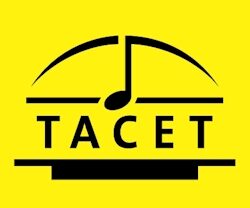
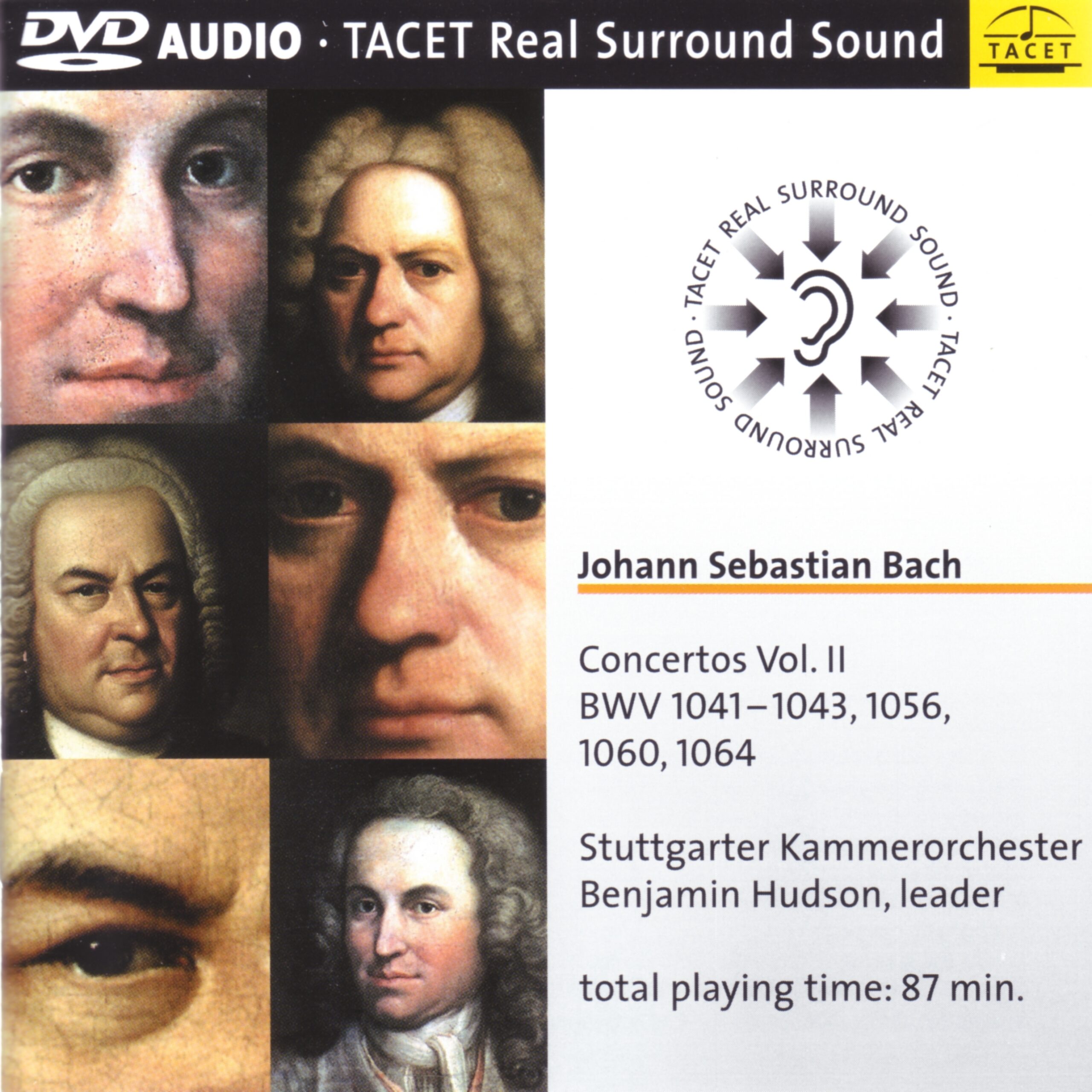
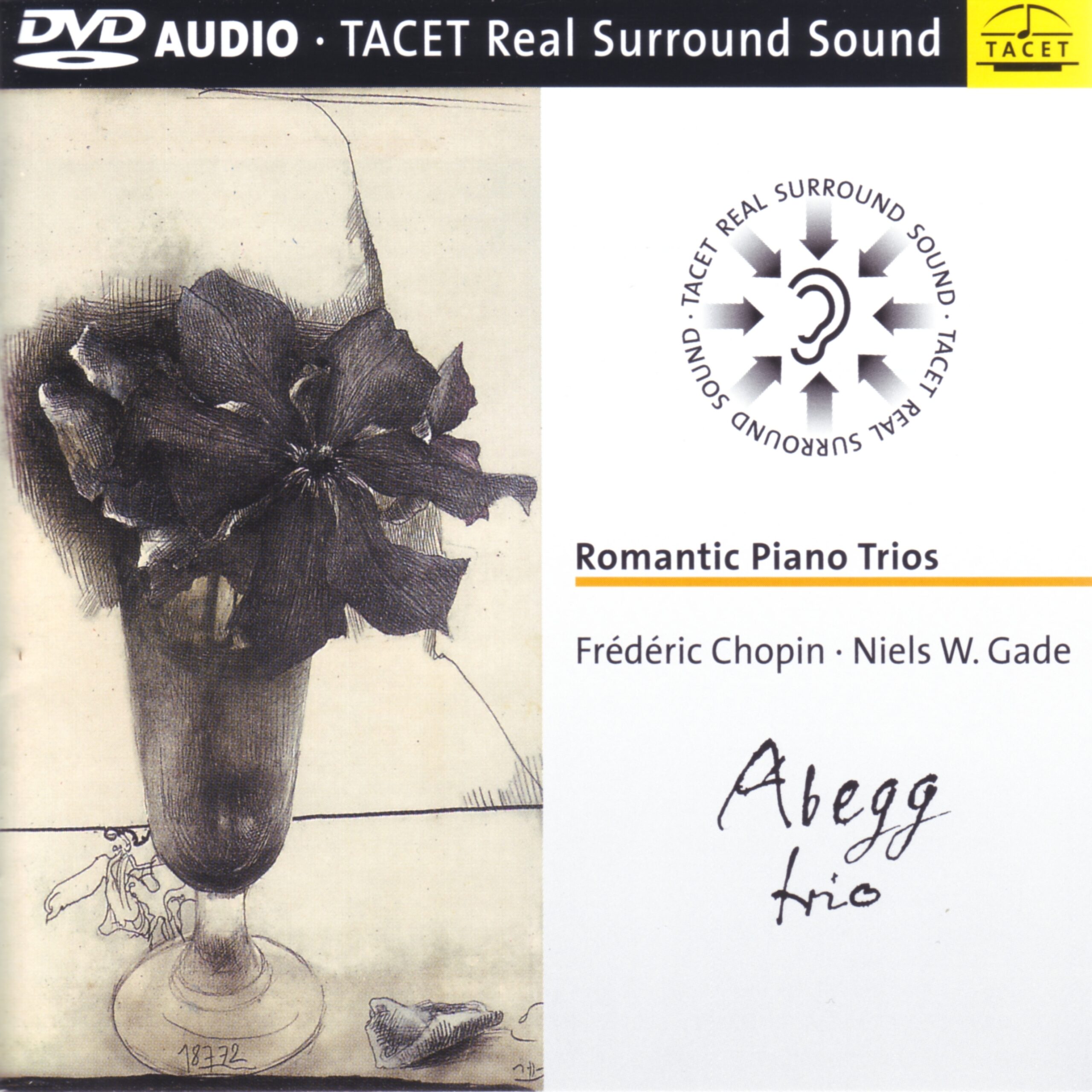
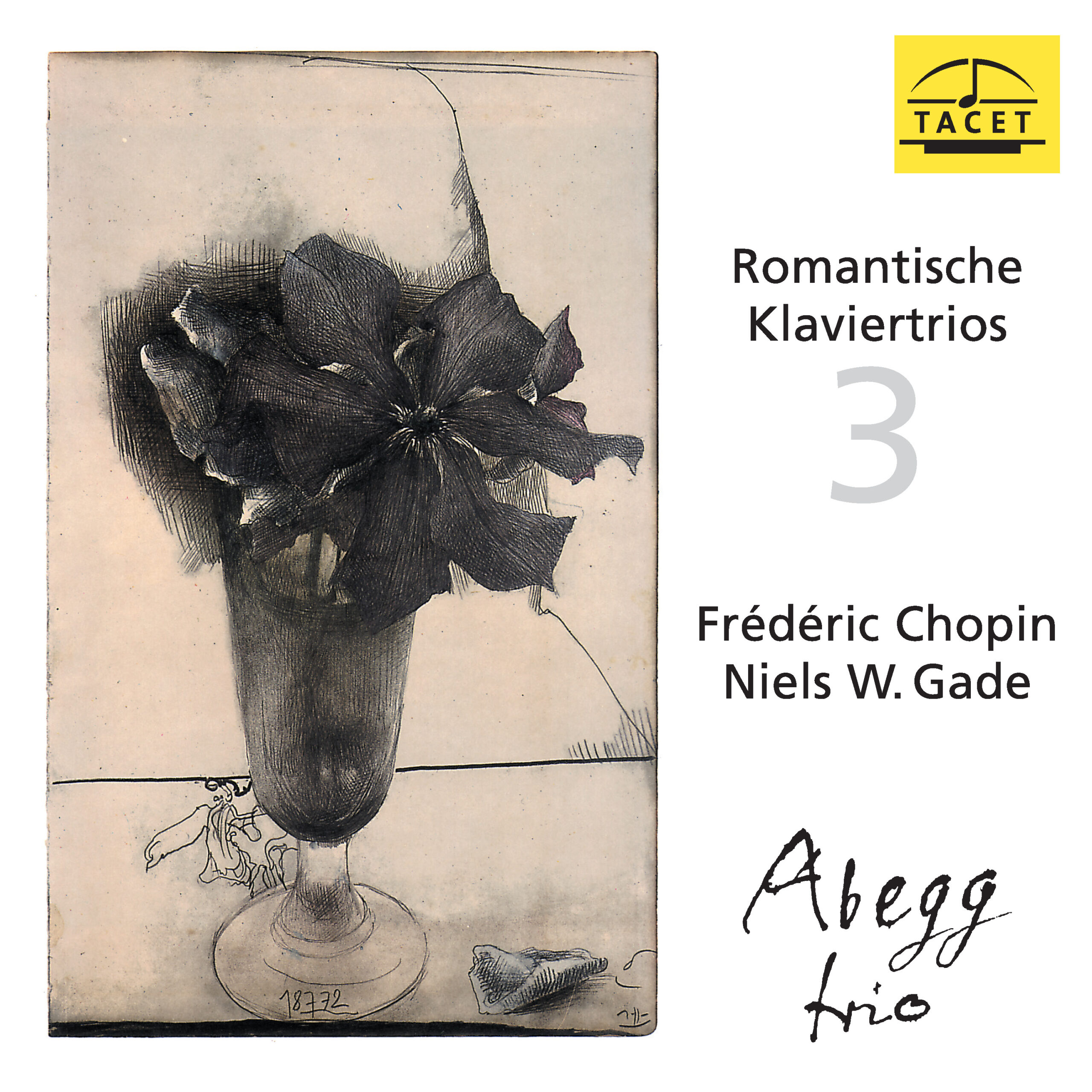
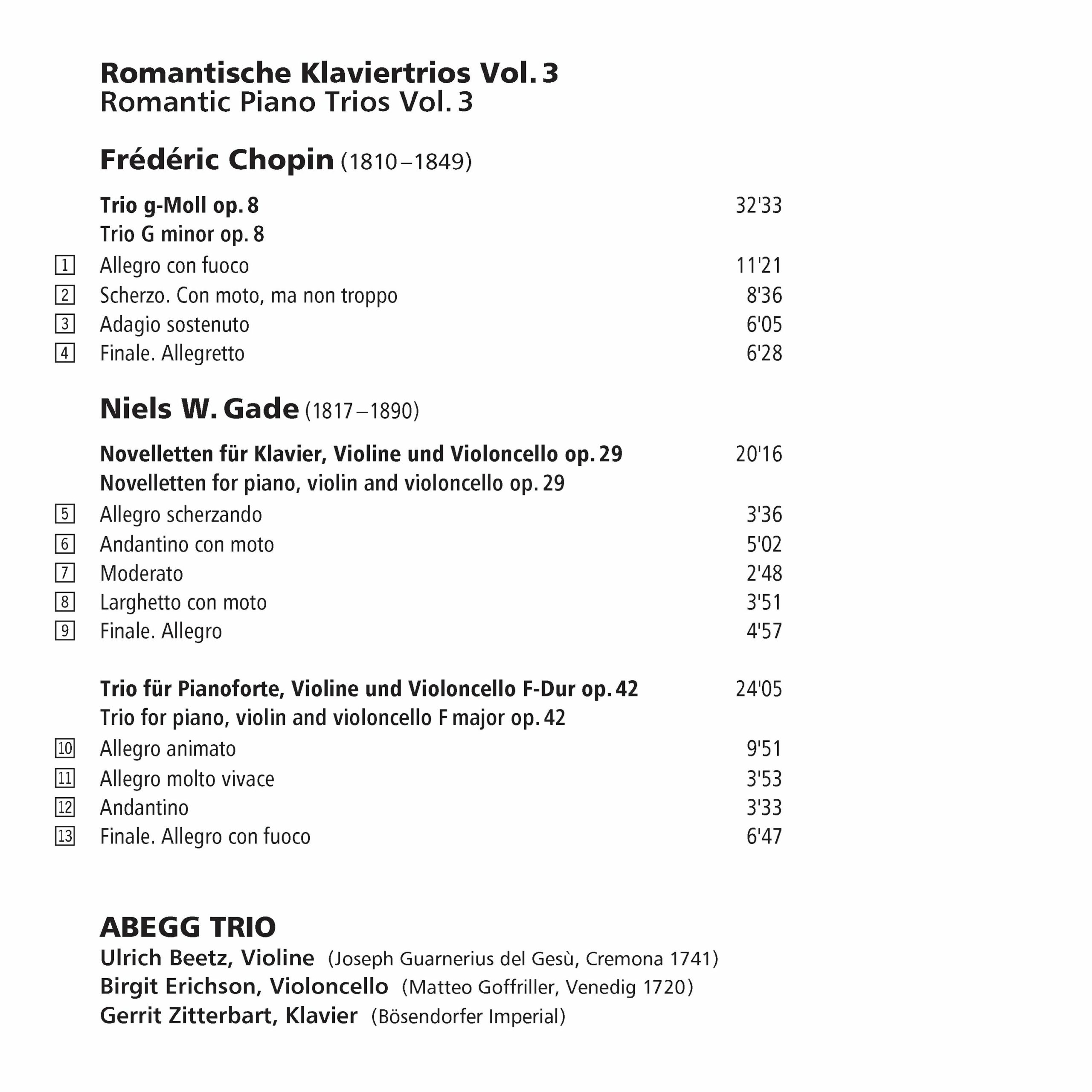
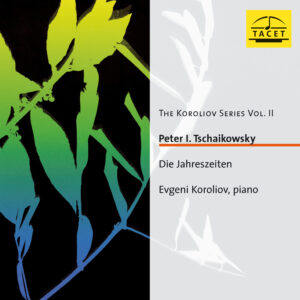
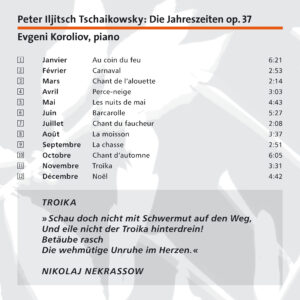
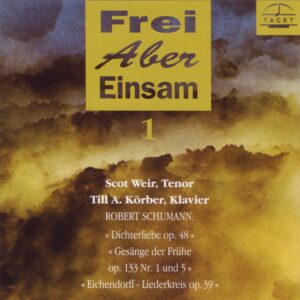
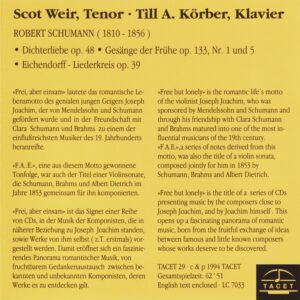
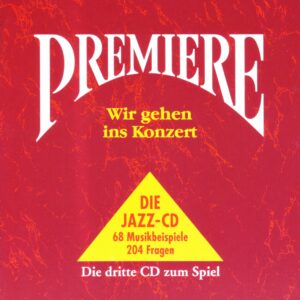
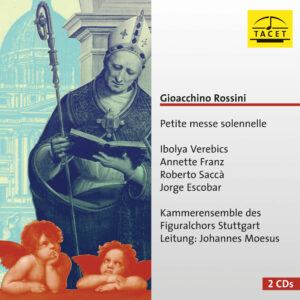
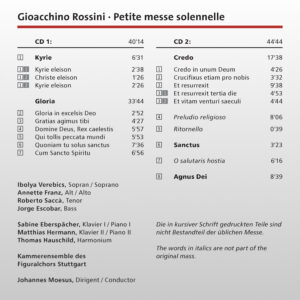
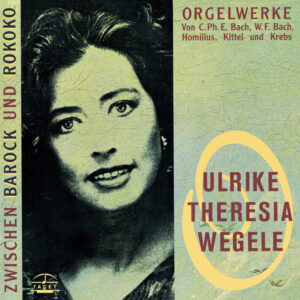
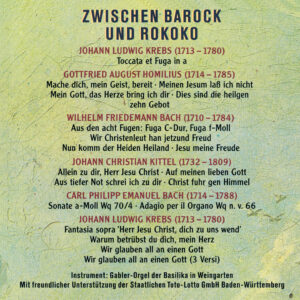
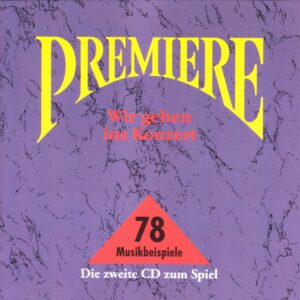
Classics Today –
This CD is recommendable for the two works by Gade, rather than the piano trio by Chopin. While the Chopin Trio (the Polish composer′s only large-scale chamber piece for more than two instruments) occasionally betrays its author′s unease in balancing piano with two strings, both of the Gade works are technically self-assured and achieve the desired chamber music effect of a conversation among equals.
The two outer movements of Gade′s F major trio deftly develop their attractive principal ideas in larger time spans while the inner movements (a scherzo and a charming Andantino slow movement) are both less than four minutes long, so the total timing is a compact 25 minutes. The other Gade work, bearing the Schumannesque title "Novelletten", comprises five miniatures that effectively add up to a full-scale 20-minute trio. Both works show total mastery of material and means, albeit at no point do they rise to the beguiling fantasy of the best parts of the Chopin, particularly its enchanting Adagio sostenuto slow movement. Part of the fascination of this imaginatively programmed disc arises from this demonstration of how Chopin′s sheer inspiration sometimes trumps Gade′s technical excellence. But the Gade works are fine enough, and in these excellent performances they make a desirable addition to any collection of Romantic chamber music.
This 2001 recording shows that the Abegg Trio has matched if not eclipsed the finest ensembles of its type. The three members (Ulrich Beetz, violin; Birgit Erichson, cello; and Gerrit Zitterbart, piano) truly breathe and play as one. The Chopin performance is at least equal to the Beaux Arts′ Philips release, and the Gade is unmatched. I have a slight reservation regarding the sound, namely that the piano (left channel and center) has a slightly distant, hollow quality in the stereo release (the program also is available in DVD-A surround, TACET D112), while the two strings are parked mainly in the right channel.
Joseph Stevenson
Pforzheimer Zeitung –
The Abegg Trio now adds two less frequently heard piano trios—by Frédéric Chopin and Niels W. Gade—to its broad repertoire, which spans from Mozart to Rihm. Chopin’s Piano Trio, one of the few compositions in which he did not write exclusively for the piano, is a melodically appealing work, though it lacks the complexity found in, for example, Beethoven’s contributions to the genre. The Abegg Trio approaches the piece with a keen sense of nuance and palpable joy in playing. Of greater compositional weight is Gade’s Trio in F Major, Op. 42, accompanied here by his charming "Noveletten," Op. 29. In these works, the Abegg Trio not only demonstrates its profound skill and cohesive ensemble playing, but also finds ample opportunity to showcase beautiful string timbres, particularly in Gade’s music, which follows the tradition of Mendelssohn and Schumann.
tw
Markus Zahnhausen –
Founded in 1976, the Abegg Trio has become one of the most successful piano trios, with numerous award-winning CD recordings. The ensemble specializes in Romantic repertoire, but not just the mainstream works—it also champions lesser-known compositions by composers such as Louise Farrenc, Clara Schumann, Berwald, Goetz, and Gade. Their new CD, featuring trios by Chopin and Gade, once again highlights these less-trodden musical paths. While Chopin’s trio—composed when he was just nineteen—perhaps places too much emphasis on the piano and treats the violin somewhat neglectfully, Gade’s works reflect the maturity of an experienced composer nearing fifty: His Noveletten are pointed, exquisite miniatures of Romantic chamber music, and his lyrical trio is also more formally cohesive. The Abegg Trio performs superbly, fully doing justice to the music of these two very different composers. The exceptionally well-written and detailed liner notes by Jan Reichow complete this highly recommendable recording.
Markus Zahnhausen
Hannoversche Allgemeine Zeitung –
Under the title "Romantic Piano Trios" (Tacet 112), the Abegg Trio explores uncharted territory with its characteristic and unflagging enthusiasm—even after twenty-five years. Even comprehensive chamber music guides only mention Chopin’s G minor Trio (composed when he was just nineteen) and the Noveletten and F Major Trio by the Dane Niels W. Gade in passing. The Abegg Trio, whose instruments are superbly balanced in sound, performs these hidden gems with first-class musicianship. They awaken these works from their undeserved slumber and **illuminate the Romantic era—often overlooked at Europe’s periphery—with a wonderful sense for lyrical simplicity and folkloric echoes.
Ludolf Baucke
Rhein-Neckar-Zeitung –
On their recently released anniversary CD, the Abegg Trio—which has performed in its unchanged lineup since 1976 (Ulrich Beetz/violin, Birgit Erichson/cello, Gerrit Zitterbart/piano)—turns its attention to two Romantic-era contemporaries whose key works are either largely unknown or persistently underrated. Alongside Frédéric Chopin’s mysteriously neglected G minor Trio, Op. 8, the trio’s renditions of Niels Wilhelm Gade’s chamber works—previously available only in a mediocre Danish recording—are particularly revelatory.
The Abegg Trio demonstrates with intelligent and inspired interplay that Gade, once admired and supported by Mendelssohn and Schumann, was far more than a boring epigone with an impersonal musical language. His F Major Trio, Op. 42 (1863), despite occasional echoes of his German predecessors, bears the distinctive mark of the Dane. It is wonderfully pastel-hued, delicate music, free of sharp spices or agonizing conflicts—the work of a rarely content and balanced Romantic. The trio avoids the overly saccharine sentimentality of many Gade interpretations, proving instead that such entertaining chamber music need not be lacking in tension or stolid. The five Schumannesque "Novelettes," Op. 29, form a cyclically convincing "encore series" that splendidly complements the ensemble’s nuanced Gade portrait—a discographic rehabilitation par excellence.
Chopin’s expansive, lush early work serves as a prominent opener for this fine disc, and it is by no means to be dismissed. Beetz/Erichson/Zitterbart thoroughly dismantle the common prejudices against this supposedly weak piece, making a compelling case for its long-overdue inclusion in the standard repertoire. Only the con fuoco of the lengthy first movement might have been rendered with a bit more incisiveness. What unfolds is an attractive chamber-music anticipation of the piano concertos that followed, yet one that still assigns significant roles to the two string players.
Andreas Spreer’s brilliant recording technique and Jan Reichow’s stimulating liner notes complete this significant CD production, which once again meets the highest "Abegg" standards and—thanks to its comprehensive qualities—should be part of every serious trio enthusiast’s collection.
Klaus Roß
Deutschlandradio Kultur –
...The Abeggs, with their keen sensitivity to nuance, find a perfect match in this work [F. Chopin – Piano Trio in G minor, Op. 8]. Chopin’s Op. 8 unfolds in such a way that one becomes increasingly attuned to the subtleties of bowing and touch. And this ensemble truly has much to offer in that regard. So, one needs time and patience to fully listen...
Chopin’s Piano Trio in G minor is not the only work featured on this new CD by the Abegg Trio. They have also unearthed Niels Gade’s relatively late Trio in F major, as well as his earlier Noveletten, Op. 29, in the unusual scoring for piano, violin, and cello. Gade, a violinist by birth, was considered a Danish original genius in his time. While we know that Brahms prized comfort above all else, though he didn’t always fully compose it, for Gade, comfort was a creative credo. He certainly had passion—as long as one doesn’t pronounce the word too decisively, but rather diminuendo and ritardando. Art may well have been existential for him, but on the other hand, he saw little reason to doubt existence. His piano trio is a perfect lesson in Romantic composition. It is simply flawless. It never disturbs; everything is rounded and in its place. One leans back and finds life simply beautiful. Any questions?
Yes. Why are the Noveletten by the same composer so rarely performed? After all, they are full of verve and wit. One doesn’t have to play all five in a concert, but they certainly lend themselves as encores. They have a proper finale (so labeled) and begin with a scherzo...
..For the recordings in Frankfurt’s Festeburgkirche, Andreas Spreer of TACET used, among other equipment, two Neumann U 47 and two M 49 microphones—legendary tube microphones from 1947 and 1949, renowned worldwide for their soft, transparent sound transmission. The result on this CD, which is nonetheless crystal clear, is pure velvet and silk. As a Berliner might say: "As if it’s floating..."
Norbert Ely
The Strad –
It′s astonishing how rarely Chopin′s G major Trio - his only extended work for chamber ensembles - has made it on to disc, given its nobility and Romantic urgency. The extensive opening Allegro is of concerto-like fervour, though Chopin carefully allocates all three instruments an equal role. The more I hear this disc, the more I like it. By and large the strings subordinate their own personality, though this can suddenly break out - both violin and cello excel in the leisurely, Brahmsian opening to the Andantino of Gade′s F major trio, for instance.
The Abegg′s audible seriousness as musicians - nothing is simply played for effect - does justice, with integrity, to the full-bodied stature of these trios. Tacet′s slightly boxed sound lends the keyboard a rather fortepiano-like sound which helps the balances.
Chopin′s Scherzo could be lighter and more cheerful - though the players′ restraint spares it salon-like triviality - and their earnest tone well serves the Adagio, full of yearning. Gade′s F major Trio is a fine, strong work, with a lovely Andantino, giving ample opportunities for the two string players - Ulrich Beetz, playing a 1741 Guaneri and Birgit Erichson, on a warm-toned Gofriller cello of 1721 - to shine. They do so even more in the enchanting Noveletten, a set of pieces in contrasting moods: a perky Scherzando; cello attracztively shadowing violin in the larghetto; appealing pizzicato strumming in the finale; and some bewitching misteriose touches beautifully managed by both strings in the central Moderato.
Roderic Dunnett